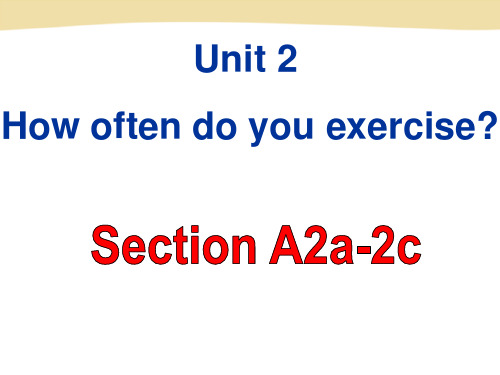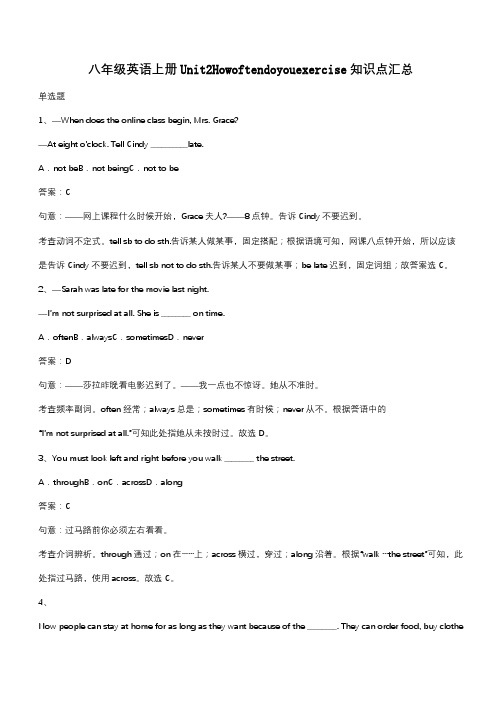2013年秋八年级英语上册 Unit 2 How often do you exercise教案 (新版)人教新目标版
- 格式:doc
- 大小:95.50 KB
- 文档页数:13



⼈教新⽬标⼋年级英语上册思维导图课堂笔记Unit2HowoftendoyouexerciseUnit 2 How often do you exercise?2013版⼈教新⽬标⼋年级英语上册思维导图课堂笔记1. housework n. 家务劳动;家务事We should help our mothers do the housework. 我们应该帮助妈妈做家务。
不可数名词do the housework做家务homework家庭作业homework家庭作业workhouse劳动救济所schoolwork课堂作业workplace⼯作场所workhorse吃苦耐劳的⼈workbook练习册2. hardly adv. ⼏乎不;⼏乎没有There’s hardly any tea left. 没有剩下什么茶。
表否定,改反意疑问句时,疑问部分⽤肯定形式This boy hardly eats junk food,does he?=almost nothardadv.努⼒地;艰难地adj.困难的3. ever adv. 在任何时候;从来;曾经Don’t you ever get tired? 难道你从来不累吗?hardly ever⼏乎从不ever since⾃从常⽤于疑问句和否定句中neveradv.从不,从来没有4. once adv. ⼀次,曾经The farmers here sow once a year. 这⾥的农民⼀年播种⼀次。
once a week⼀周⼀次意为“曾经”时,常与过去时连⽤。
位于⾏为动词之前、系动词之后。
He once lived in Hangzhou.This book was famous once,but now nobody reads it.5. twice adv. 两次,两倍I go shopping twice a week. 我⼀个星期购物两次。
Cats sleep twice as much as people. 猫睡觉的时间是⼈的两倍。

最新(2013秋)人教版八年级上册英语知识点Unit 1 Where did you go on vacation?(谈论假期生活,一般过去时)Unit 2 How often do you exercise?(谈论生活习惯,一般现在时)Unit 3 I'm more outgoing than my sister(谈论事物对比,形容词比较级)Unit 4 What's the best movie theater?(谈论事物比较,形容词最高级)Unit5 Do you want to watch a game show?(谈论内心想法,一般现在时)Unit6 I’m going to study computer science.(谈谈生活的目标,一般将来时)Unit7 Will people have robots?(对将来生活的预言,一般将来时)Unit8 How do you make a banana milk shake?(描述进程,祈使句)Unit9 Can you come to my party?(学习邀请,作出、接受和拒绝邀请,学习表请求的句子) Unit10 If you go to the party, you’ll have a great time.(作出决定,学习if的条件状语从句)①复习一般过去时②复合不定代词的用法③反身代词的用法④系动词的用法⑤动词后的to do和doing 的区别⑥ed形容词和ing形容词的区别⑦“近义词”的区别⑧本单元中的主谓一致现象⑨动词过去式的构成及不规则动词表⑩用同义短语转换同义句时谓语动词形式一致性的培养。
⑾感叹句的结构和连词的选择。
Unit1 Where did you go on vacation?重点短语1. go on vacation去度假at home 待在家里to the mountains 去爬山4. go to the beach 去海滩 5. visit museums 参观博物馆6. go to summer camp 去参加夏令a few 相当多for 为……而学习out 出去of the time 大部分时间11. taste good 尝起来很好吃 a good time 玩得高兴13. of course 当然like 给……的感觉;感受到shopping 去购物the past 在过去17. walk around 四处走走18. because of 因为19. one bowl of… 一碗……20. the next day第二天21. drink tea 喝茶22. find out 找出;查明23. go on 继续photos 照相25. something important 重要的事26. up and down 上上下下27. come up 出来28. buy sth. for sb. / buy sb. sth. 为某人买某物29. taste + adj. 尝起来…… 30. look+adj. 看起来………but+动词原形除了……之外什么都没有+(to be)+ adj. 看起来…… 33. arrive in+大地点/ arrive at+小地点到达某地to do sth. 决定去做某事35. try doing sth. 尝试做某事/ 36. try to do sth. 尽力去做某事37. forget doing sth. 忘记做过某事/ 38. forget to do sth.忘记做某事39. enjoy doing sth. 喜欢做某事40. want to do sth. 想去做某事41. start doing sth. 开始做某事42. stop doing sth. 停止做某事43. have a good time=enjoy oneself=have fun(doing sth.)玩得痛快44. keep doing sth. 继续做某事45. Why not do. sth.? 为什么不做……呢46. so+adj.+that+从句如此……以至于…… 47. tell sb. (not) to do sth. 告诉某人(不要)做某事三、重点句子:1. Where did you go on vacation? 你去哪儿度假的?2. Long time no see. 好久不见。

八年级英语上册Unit2Howoftendoyouexercise知识点汇总单选题1、—When does the online class begin, Mrs. Grace?—At eight o'clock. Tell Cindy __________late.A.not beB.not beingC.not to be答案:C句意:——网上课程什么时候开始,Grace夫人?——8点钟。
告诉Cindy不要迟到。
考查动词不定式。
tell sb to do sth.告诉某人做某事,固定搭配;根据语境可知,网课八点钟开始,所以应该是告诉Cindy不要迟到,tell sb not to do sth.告诉某人不要做某事;be late迟到,固定词组;故答案选C。
2、—Sarah was late for the movie last night.—I’m not surprised at all. She is ________ on time.A.oftenB.alwaysC.sometimesD.never答案:D句意:——莎拉昨晚看电影迟到了。
——我一点也不惊讶。
她从不准时。
考查频率副词。
often经常;always总是;sometimes有时候;never从不。
根据答语中的“I’m not surprised at all.”可知此处指她从未按时过。
故选D。
3、You must look left and right before you walk ________ the street. A.throughB.onC.acrossD.along答案:C句意:过马路前你必须左右看看。
考查介词辨析。
through通过;on在……上;across横过,穿过;along沿着。
根据“walk…the street”可知,此处指过马路,使用across。
故选C。
4、Now people can stay at home for as long as they want because of the ________. They can order food, buy clothes, have classes, ect.A.worldB.InternetC.supermarketD.restaurant答案:B句意:现在因为有了互联网,人们想待在家里多久就待多久。

八年级英语上册Unit2Howoftendoyouexercise重难点归纳单选题1、Eating more vegetables ________ good ________ your health.A.are;toB.is;toC.is;forD.are;for答案:C句意:多吃蔬菜对你的健康有好处。
根据be good for对---有好处,排除A/B;根据主语Eating more vegetables 动词做主语,谓语动词用单数形式;故选C2、—Does the dish taste as ___________ as it looks?—Yes. I can't wait to eat it.A.wellB.goodC.betterD.best答案:B句意:——这盘菜和看上去一样美味么?——是的。
我等不及吃它了。
考查形容词原形。
well健康的;good好的;better更好的;best最好的。
此处用“as+形容词原级+as…”表达“像……一样”,表达“和看上去一样美味”用as good as。
故选B。
3、Tim is young,______,he can speak three languages.A.butB.yetC.howeverD.though答案:C句意:Tim很年轻,但是他会说三种语言。
A. but但是;B. yet然而;C. however然而,可是;D. though尽管。
一般来说,but, yet不要加任何标点,而且通常放在句首,排除A/B;根据前后句的关系可知表示转折,排除D项;而however可以放在句首,句中或句末,一般加逗号。
本题的空后有逗号,故选C。
4、—Where shall we eat tonight?—Let's call Jack. He ____________ knows the best places to go.A.seldomB.alwaysC.only答案:B句意:——今天晚上我们在哪里吃饭?——让我们给Jack打电话,他总是知道最好的去处。
八年级英语上册Unit 2 How often do you exercise知识点归纳八年级英语上册Unit 2 How often do you exercise知识点归纳一、词组、短语:1、help with housework 帮助做家务活,2、go shopping 购物,3、on weekends 在周末,4、how often 多久一次,5、hardly ever几乎不,6、once a week 每周一次,7、twice a month每月二次,8、go to the movies去看电影,9、every day 每天,10、use the Internet上网/用网,11、be free有空,12、have dance and piano lessons 上舞蹈钢琴课,13、swing dance摇摆舞14、play tennis 打网球,15、stay up late熬夜,16、at least至少,17、go to bed early 早睡,18、 play sports 锻炼身体,19、be good for 对…有好处,20、go camping去野营,21、in one’s free time 在某人的空闲时间,22、not….at all 根本不,23、the most popular 最流行,24、such as例如,25、go to the dentist去看牙医,26、more than 超过/多于,27、Old habits die hard.旧习惯难改。
28、 hard=difficult 困难的,29、less than 少于/不到二、重要句子(语法):What do you usually do on weekends你周末通常做什么 I always exercise.总是锻炼身体。
What do they do on weekends他们周末干什么 They often help with housework.他们经常帮助干家务活。
Unit 2 How often do you exercise?2013版人教新目标八年级英语上册思维导图课堂笔记1. housework n. 家务劳动;家务事We should help our mothers do the housework. 我们应该帮助妈妈做家务。
不可数名词do the housework做家务homework家庭作业homework家庭作业workhouse劳动救济所schoolwork课堂作业workplace工作场所workhorse吃苦耐劳的人workbook练习册2. hardly adv. 几乎不;几乎没有There’s hardly any tea left. 没有剩下什么茶。
表否定,改反意疑问句时,疑问部分用肯定形式This boy hardly eats junk food,does he?=almost nothardadv.努力地;艰难地adj.困难的3. ever adv. 在任何时候;从来;曾经Don’t you ever get tired? 难道你从来不累吗?hardly ever几乎从不ever since自从常用于疑问句和否定句中neveradv.从不,从来没有4. once adv. 一次,曾经The farmers here sow once a year. 这里的农民一年播种一次。
once a week一周一次意为“曾经”时,常与过去时连用。
位于行为动词之前、系动词之后。
He once lived in Hangzhou.This book was famous once,but now nobody reads it.5. twice adv. 两次,两倍I go shopping twice a week. 我一个星期购物两次。
Cats sleep twice as much as people. 猫睡觉的时间是人的两倍。
八年级英语上册 Unit 2 How often do you exercise(第2课时)教学设计一. 教材分析本课时的教材是八年级英语上册Unit 2 How often do you exercise,主要讲述了频率副词的用法以及日常的锻炼活动。
本节课主要通过一个关于日常锻炼的对话来引导学生运用频率副词进行问答。
通过本节课的学习,学生能够掌握频率副词的用法,并能用英语询问和描述他人在日常生活中的锻炼习惯。
二. 学情分析学生在之前的学习中已经接触过频率副词,对本节课的内容有一定的了解。
但部分学生对频率副词的运用还不够熟练,需要在本节课中加强练习。
此外,学生还需要进一步提高用英语进行日常交流的能力。
三. 教学目标1.知识目标:–学生能够掌握频率副词的用法。
–学生能够用英语询问和描述他人在日常生活中的锻炼习惯。
2.能力目标:–学生能够熟练运用频率副词进行问答。
–学生能够用英语进行日常交流。
3.情感目标:–学生能够养成良好的锻炼习惯,提高身体素质。
四. 教学重难点1.重点:频率副词的用法。
2.难点:如何运用频率副词进行日常交流。
五. 教学方法1.情境教学法:通过设定日常锻炼的场景,让学生在实际情境中学习和运用频率副词。
2.交际法:引导学生进行角色扮演,模拟真实场景,进行英语交际。
3.任务型教学法:通过完成小组任务,激发学生的学习兴趣,提高学生的合作能力。
六. 教学准备1.教学PPT:制作包含本节课重点内容的PPT,以便进行教学展示。
2.教学素材:准备与本节课主题相关的图片、视频等教学素材。
3.小组任务:设计一个关于询问和描述日常锻炼习惯的小组任务。
七. 教学过程1.导入(5分钟)–教师通过提问方式引导学生回顾已学的频率副词。
–学生回答问题,复习频率副词的用法。
2.呈现(10分钟)–教师通过PPT展示本节课的主题:日常锻炼。
–教师呈现一组关于日常锻炼的图片,引导学生用英语描述图片内容。
3.操练(10分钟)–教师引导学生进行角色扮演,模拟真实场景,用频率副词进行问答。
Unit 2 How often do you exercise?Section A 1 (1a-2d)一、教学目标:1. 语言知识目标:1) 能掌握以下单词: housework, hardly, ever, hardly ever, once, twice, Internet, program, full, swing, swing dance, maybe, least, at least能掌握以下句型:① —What does he do on weekends? —He usually watches TV.② —How often do you watch TV? —I watch TV every day.③ —Does he go shopping? —No, he never go shopping.2) 能了解以下语法:频度副词及一般现在时简单谈论周末活动情况。
2. 情感态度价值观目标:通过本单元的学习,养成健康的饮食习惯,保证充足的睡眠时间,进行合理的运动锻炼,以保持健康的体魄。
培养学生的逻辑表述能力,激发学生的积极思维,并使学生互相了解,增进友谊,加强人际交往,以形成良好的人际关系。
二、教学重难点1. 教学重点:1) 对6个频度副词细微差异的理解及使用。
2) 弄清一般现在时在不同人称下动词形式及提问的变化。
2. 教学难点:1) 第三人称单数谓语动词在此核心句型中的运用。
2) 谈论课余时间的各项活动,以及初步认识和使用频率副词。
三、教学过程Ⅰ. Lead inTalk about your last weekend’s activities.Ⅱ. Presentation(1) 教师问:“What do you usually do on weekends ? ” (并且板书)让学生根据自己的实际回答I usually …… on weekends.(2) 教师出示动词卡片 watch TV,read books,exercise,swimplay football、go shopping、go to movies让学生回答。
(3)点击鼠标屏幕上出现频率副词及相关的百分比。
always (100%) usually(80%) often (30-50%)sometimes (20%) hardly ever(5%) never (0%)领读频率副词,让学生快速认读。
Ⅲ. Writing1. Look at the picture. Discuss with your partners. Make a list of the weekend activities.2. Let some Ss read out their activities. Let other Ss add more activities.Ⅳ. List ening1. Let a student read the words aloud. Make sure all the Ss know the meaning of the words.2. Tell Ss to listen and write the letters from the picture above on the line below.3. Play the tape for the first time. Ss listen and fill in the blanks.4. Play the tape for the second time for the Ss to check the answers.Ⅴ. Pair work1. Act out the conversation with a student.2. Let Ss talk about the pictures in 1a in pairs.3. Let some Ss act out their conversations.Ⅵ. ListeningWork on 2a:1. Let Ss read the phrases in the chart.2. Tell Ss that Cheng Tao is taking about how often he does these activities. Play the recording for the first time. Ss listen and number the activities [1-5].3. Play the recording for the second time for the Ss to check the answers.Work on 2b:1. Tell Ss they will hear the recording again. This time, listen and match the activities in 2a with how often Cheng Tao does them.2. Ss listen and math the activities with the phrases.3. Check the answers.Ⅶ. Pair work1. Ask one student how often he/she watch TV as a model.T: Hi, S1. How often do you watch TV?S1: I watch TV every day.T: What’s your favorite program?S1: Animal world.T: How often do you watch it?S1: Twice a week.2. Let one student read the activities in the chart. Tell them these new words:favorite website (最喜欢的网站);favorite sport (最喜欢的运动)3. Ss work with their partners. Then ask some pairs to act out their conversations. Ⅷ. Role-play1. Read the conversation by themselves, then match the activity with the right time. Dance lesson TuesdayPiano lesson Wednesday and FridayPlaying tennis Monday2. Let the Ss read the conversation after you.3. Ss work with a partner and act out the conversation. Then let some pairs to act out the conversation in front of the class.Homework:1. Act out the conversation after class.2. 翻译句子①周末你通常做什么事情?我通常踢足球。
____________________________________②周末他们做什么事情?他们经常去看电影。
___________________________________板书设计:Section A 2 (Grammar Focus-3c)一、教学目标:1. 语言知识目标:1) 复习运用频率词汇及询问活动频率。
2) 一般现在时态的熟练运用。
2. 情感态度价值观目标:通过本单元的学习,养成健康的饮食习惯,保证充足的睡眠时间,进行合理的运动锻炼,以保持健康的体魄。
培养学生的逻辑表述能力,激发学生的积极思维,并使学生互相了解,增进友谊,加强人际交往,以形成良好的人际关系。
二、教学重难点1. 教学重点:1) —How often do you /does he(she)….? —He usually…2)频度副词的用法:always; usually ; often ; sometimes; hardly ever; never 2. 教学难点:1) 第三人称单数谓语动词在此核心句型中的运用。
2) 能够谈论课余时间的各项活动,以及初步认识和使用频率副词。
三、教学过程Ⅰ. Warming- up and revision1. Ask and answer some oral questions on how often exercise.2. Check the homework and have a dictation of some new words.Ⅱ. Grammar Focus.1. 学生阅读Grammar Focus中的句子,然后做填空练习。
1) 你通常在周未做什么?______ ____ you _______ do on weekends?2) 我总是去运动。
I _______ _______.3) 他们总是在周未做什么事情?______ _____ they ________ on weekends?4) 他们经常帮助做家务。
They ________ _______ with housework.5) 她在周未做什么?What ______ she _______ on weekends?6) 她有时候去购物。
She _________ _______ _________.你多久去看电影一次?_____ _____ do you go to the _________?7) 我可能一个月去看一次。
I go to movies ______ _______ a ________.8) 他多久看一次电视?______ _______ does he watch TV9) 他几乎不看电视。
He ________ _______ watches TV.10) 他去购物吗? ______ ___ go shopping?11) 不,他从不去购物。
No, he _______ ______ shopping.3. 学生们完成填空试题后,可以打开课本检查答案,对错误的句子,单独进行强化记忆。
Ⅲ. Try to Find1. Tell Ss try to find the answers.A: how often 意为“__________”,是用于提问表示__________的特殊疑问词组。